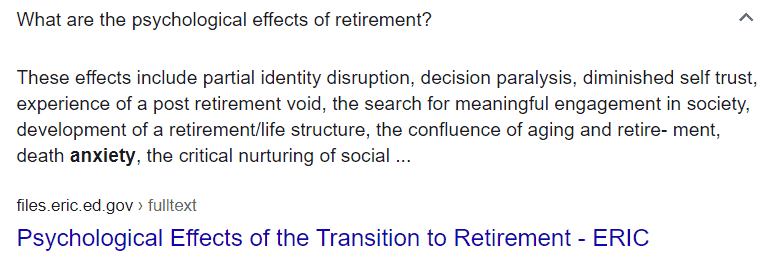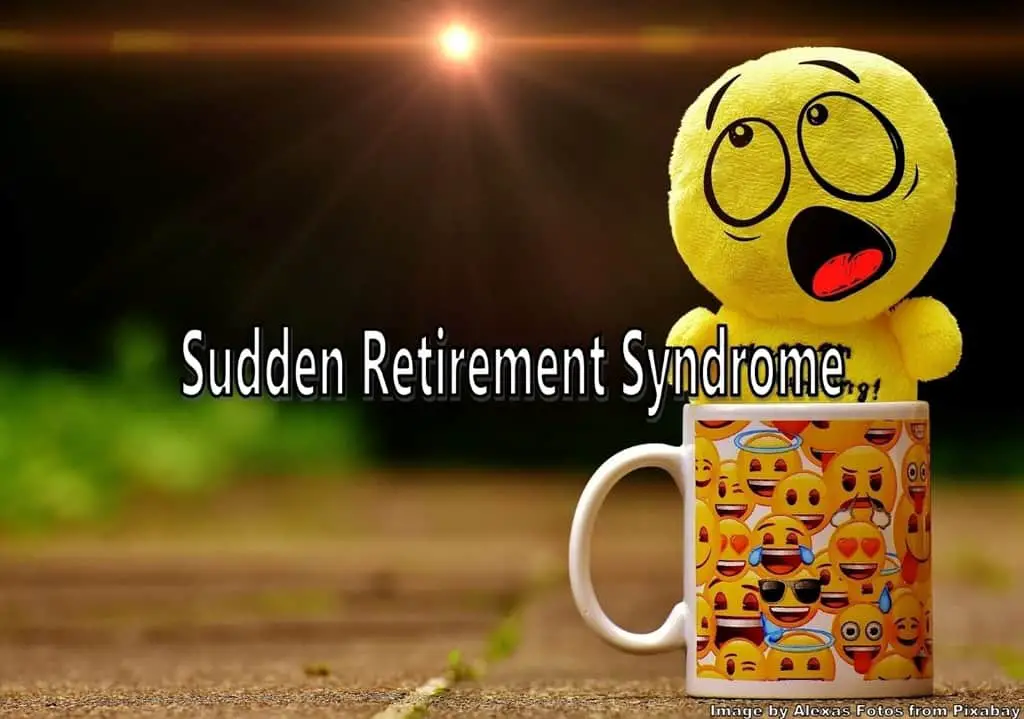The majority of people look forward to the day they can leave the treadmill of work behind. Perhaps for the first time ever, they can slow down and start enjoying themselves.
In many respects, a reward for all those years of hard work. What they don’t realize, seldom will it be what they expected. In fact, this can lead to sudden retirement syndrome where they're miserable, pessimistic and suffering.
Instead of everything being wonderful and rosy, it's anything but! They're at loose ends, nothing seems interesting with no end in sight.
There isn't much to look forward to in the next 20 to 30 years unless you can get past this huge hurdle. The question is how to make it happen so your retired years are, truly, golden.
What Is Sudden Retirement Syndrome?
This is the shock of transitioning from a busy successful life to a quiet idyllic lifestyle. No more rushing to work, solving problems, and meeting almost impossible deadlines.
Now, you have all the time in the world. Such an abrupt shift creates a whole new set of stresses.
Work provides structure, social interaction, and the feeling of accomplishment. Some people thrive on the “busyness” and being part of a team.
Without all this, there’s a gaping hole in their lives.

Let’s expand upon this concept. While “letting go” is certainly part of it, having something to “retire to” becomes equally vital. You might eagerly look forward to the day you leave work. It isn’t a permanent vacation and lots of folks find they miss work.
Sudden Retirement Syndrome is unexpected and, usually, not your choice. Job loss can occur due to a plant closure, economic slowdown leading to lay offs, or corporate downsizing.
The pandemic is further accelerating this trend. Health issues may also force your hand whether it’s yourself or a loved one.
When My World Was Rocked
Over the years, my former employer annually downsized about 10% of their employees.
This became survival of the fittest where you didn’t want to be labeled a low performer.
Interestingly, this policy created a culture where an older worker would “let up on the gas” in the hopes of receiving a severance package.
This was the screwed-up world of my corporation. Although job security was a crap shoot at best, I felt fairly safe.
My role was a “Customer Systems Engineer”, working with some of our largest clients.
One of my crowning moments was a contract worth $25 million. A massive win gaining executive management accolades.
I felt secure with even bigger opportunities on the horizon.
Then my life imploded!
Management decided to cut much deeper targeting anyone over 50. After so many years of cuts, I should've seen it coming.
Forever etched in my mind was the day they called me into the boardroom.
“Today is your last day, effective immediately your employment is terminated”. I had an hour to gather my personal belongings.
Shock and disbelief paralyzed me. After 25 years of loyal service, this couldn’t be happening!
I wasn’t ready. I loved my job, the clients, and the people I worked with.
The following days left me in a fog of disbelief and denial. Then came the hurt and anger. Never before had I felt so lost.
My experience isn’t unique, this sort of thing happens every day across the country. Change is never easy’ and becomes even more difficult when forced upon us.
Dealing with being forced to retire captures all the stuff I wish I’d known back then.
Who's at Risk?
Obviously, some of my colleagues were joyous to receive a severance package and leave the rat race behind. Others, like myself, struggled. Going from a busy rewarding career to being cast aside is a major shock and adjustment.
Apparently, this is quite common throughout the corporate ranks. After years of dedication and clawing their way to the top, executives are regularly “put to pasture”.
They want fresh blood and new ideas. Meanwhile, these individuals need to piece their lives back together.
Other occupations at high risk include doctors, fire fighters, police, and other first responders. Their daily duties often include life and death decisions.
They invest their hearts and souls into making this world a better place. There’s a real risk of psychological impacts from these careers after retiring.
Retirement Syndrome Symptoms
A whole host of symptoms can manifest themselves. These could include:
The Psychological Effects of Retirement
Imagine a deep-sea diver coming to the surface too quickly. They would be in distress, suffering the “bends”, a life-threatening condition.
The psychological impacts of sudden retirement syndrome can be equally severe.

Identity Loss
Seldom discussed, loss of identity is a real issue. Your job provides a certain status and social standing. Rightly or wrongly, we define others by what they do.
For instance, if you met a female engineer, you might assume she’s smart, a high achiever (competing in a male dominated field), and earns more than the average person.
All that from her job title! Now, instead of engineering bridges, she might be reorganizing the kitchen pantry. Her feelings of self-worth might plummet. Family and friends can’t relate, they’re envious she can afford to retire.
Our society doesn’t associate “being retired” as particularly prestigious. And it goes much deeper than the loss of one’s title. All the power and authority associated with the position dissipates. The sad truth is you’re no longer in charge.
Younger generations tend to view us as over the hill and no longer relevant.
Fear of Outliving Your Savings
The number one fear is running out of money. With an underfunded Social Security system, volatile investment returns and never-ending inflation, it’s justified.
Even those who have achieved comfortable nest eggs, may find it almost impossible to spend their money. Their frugal lifestyle has become too entrenched and there’s so many uncertainties what the future will bring.
One of the greatest concerns is future health and medical expenses. According to Fidelity, the average 65-year-old American couple can expect to pay $285,000 in healthcare costs.

Fear of Retiring and Outliving Your Savings expands upon the challenges and how to deal with this.
All we can do is prepare as best as we can. Rather than allowing ourselves to be consumed with anxiety, focus on the present and enjoying life.
Loss of Friendships
One of the greatest psychological effects is the loss of friendships and feeling alone. At work, you may have been part of several teams.
Many friendships develop and you might consider this the most enjoyable aspect of working. Once you leave, the majority of your friends will remain busy and daily contact is lost.
Before long you’ve lost touch and they’ve faded away. Loss of Work Friends sheds more insights into this.
Fear of Growing Old
None of us are getting any younger. Aging might be one of the more troubling aspects associated with retiring. No one wants to grow old, feeble, and become dependent upon others.
Not that long ago, I celebrated my 60th birthday. A milestone which caught me off-guard. I didn’t feel any older, yet it’s scary how age creeps up on us. Fear of Growing Old shares thoughts on what age really means.
On a more positive note, we’re living longer healthier lives. We can choose to age gracefully by keeping active and taking better care of ourselves.
Closing Thoughts
The decision to leave work is not always an easy one. Sometimes the choice is forced upon us making the transition even more difficult.
Regardless, for many, they mourn the loss of friendships, status, and the authority / respect they once had. Further to this, they’re no longer busy and need to find meaningful activities.
The more invested you are in your career, the more difficult it can be to let go. To move forward requires embracing the future and achieving a fulfilling new chapter in life.


I think the best preventative for this is to have a life! Meaning its unhealthy to have a life centered only around your job, you should have a main hobby and a half dozen runner up hobbies, some of which are shared with your spouse and all of which are shared with friends. I know that is possible because even though I ran a billion dollar company I still ran marathons, competed on tennis teams, hiked and bushwhacked, fished, read, cooked, skied, traveled and volunteered for multiple organizations. When I switched from 50 hours of work to 8 hours a week of paid consulting I just amped up all the hobbies my wife and I shared and the ones I did with my friends. That was five years ago, and life’s been very good. Even better than my corporate days.
Couldn’t agree more, Steve. You hit the nail right on the head! You work to live not live to work. And, yes, focusing on your personal life rather than professional one is healthier and more productive in the long run. Thanks for sharing your thoughts!